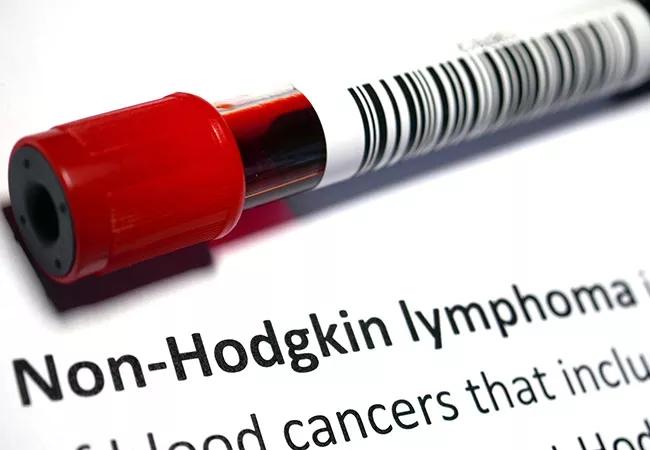62% of patients were progression-free at 18 months post-transplantation

A phase 2, multicenter study demonstrated that consolidation therapy with pembrolizumab after autologous stem cell transplantation (ASCT) is a feasible approach and resulted in favorable progression-free survival among patients with T-cell non-Hodgkin’s lymphoma. This research, which was recently presented during the 64th annual meeting of the American Society of Hematology (ASH), is the first to show the potential of PD-1 blockade as consolidation therapy in peripheral T-cell lymphomas.
Advertisement
Cleveland Clinic is a non-profit academic medical center. Advertising on our site helps support our mission. We do not endorse non-Cleveland Clinic products or services. Policy
“Overall, peripheral T-cell lymphomas (PTCL) have a poor prognosis, and ASCT in first remission is considered standard of care to help improve progression-free survival among these patients,” explains study author Craig Sauter, MD, Director of the Blood and Marrow Transplant Program at Cleveland Clinic. “However, a significant number of patients will relapse following ASCT.”
“When it comes to this approach, there is a lack of prospective, randomized trials, so the intention of this study was to explore standard of care ASCT followed by maintenance therapy for peripheral T-cell lymphoma patients in first remission as a way to improve disease control by improving progression-free survival,” says Dr. Sauter, who participated in this research effort at his previous institution.
This phase 2, multicenter study explored the addition of the anti–PD-1 monoclonal antibody pembrolizumab following ASCT among several lymphoma subtypes, including peripheral T-cell lymphoma. Between January 2017 and July 2020, 21 patients were enrolled in the study, with a median age of 58 years. The most common histology, according to study authors, was PTCL (52%). Other histologies included angioimmunoblastic T-cell lymphoma (19%), extranodal NK/T-cell lymphoma, nasal type (14%), ALK- ALCL (10%) and monomorphic epitheliotropic intestinal T-cell lymphoma (5%). Arm C, which is the focus of this analysis, included patients with PTCL in first remission.
Patients were given pembrolizumab 200 mg. IV every three weeks for up to eight cycles starting within 21 days of post-ASCT discharge, when possible. Dr. Sauter and colleagues hypothesized that consolidation treatment with pembrolizumab would improve the 18-month progression-free survival rate to 70%. With a sample size of 21, they noted that this treatment would be considered promising if at least 13 patients remained alive and progression-free at 18 months post transplantation. The secondary endpoints included overall survival, response rate to pembrolizumab in those with measurable disease after ASCT and safety.
Advertisement
Researchers assessed treatment response via PET and CT scans at weeks 10 and 22, and at 12 and 18 months post-ASCT. At week 10 if radiographic progression was documented, patients who were tolerating the regimen were allowed to continue treatment.
Of the 21 enrolled patients, 14 completed all of the planned eight treatment cycles. The reasons for treatment discontinuation included toxicity (n=4), progressive disease (n=1), withdrawal of consent (n=1) and COVID-19 (n=1).
Among all patients, 13 (62%) were progression-free at 18 months post-ASCT, which meets the primary endpoint, according to Dr. Sauter. Of the other patients, three had progressive disease and five were lost to follow-up. With a median follow-up of 34.8 months, the study authors reported a median progression-free survival of 30.1 months and a median overall survival of 38.7 months.
The toxicity assessment included all patients who received at least one dose of the study treatment (n=21). Of those, 17 patients experienced at least one toxicity. Toxicities of any grade included nausea, alkaline phosphatase increase, diarrhea, abdominal pain, hypothyroidism, alanine aminotransferase increase, anemia, arthralgia and aspartate aminotransferase increase.
Dr. Sauter and his colleagues concluded that consolidation therapy with pembrolizumab post-ASCT is a viable treatment approach and resulted in a favorable profession-free survival that met the study’s primary endpoint.
“Progression-free survival is expected to be 40% to 50% at 1.5 to 2 years for the majority of patients with peripheral T-cell lymphoma, proceeding into ASCT in the first chemotherapy-sensitive remission,” notes Dr. Sauter. “This cohort of a larger prospective phase 2 study demonstrated a 62% progression-free survival at 18 months, with adequate follow up of nearly three years. I would interpret these findings as mildly exciting, understanding that it was a small cohort of patients with large statistical confidence intervals and would need to be demonstrated in a larger prospective fashion.”
Advertisement
Peripheral T-cell lymphomas are rare lymphomas and within this disease there are many rare subtypes, according to Dr. Sauter, who noted that it will, therefore, be challenging to study this approach further in a larger cohort of patients.
“I do believe well-designed studies with larger patient populations in certain subsets with rationally investigated maintenance therapy should continue to be conducted in this space,” Dr. Sauter says. “Maintenance therapy should be investigated beyond standard of care transplant because clearly those standards result in somewhat modest results and there have been successes with maintenance therapy following autologous transplant in other lymphomas. So, we should keep that avenue of investigation open.”
Advertisement
Advertisement

Addressing rare disease and challenging treatment course in an active young patient

Study measures real-world outcomes for relapsed or refractory large B-cell lymphoma

Optimized responses in transplant- and CAR T-cell therapy-eligible patients

CAR T-cell therapy, bispecifics and antibody drug conjugates have changed disease management

Global R&D efforts expanding first-line and relapse therapy options for patients

Two thirds of patients responded to CAR T-cell therapy

Distinct molecular features found in five subtypes of disease

Patients who relapse early after first-line chemotherapy are often, but not always, refractory to second-line chemotherapy